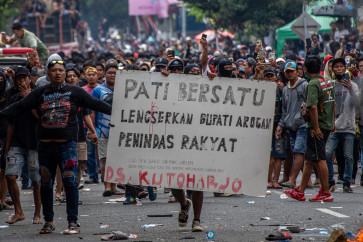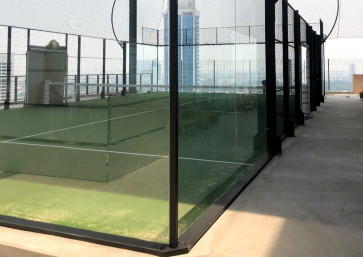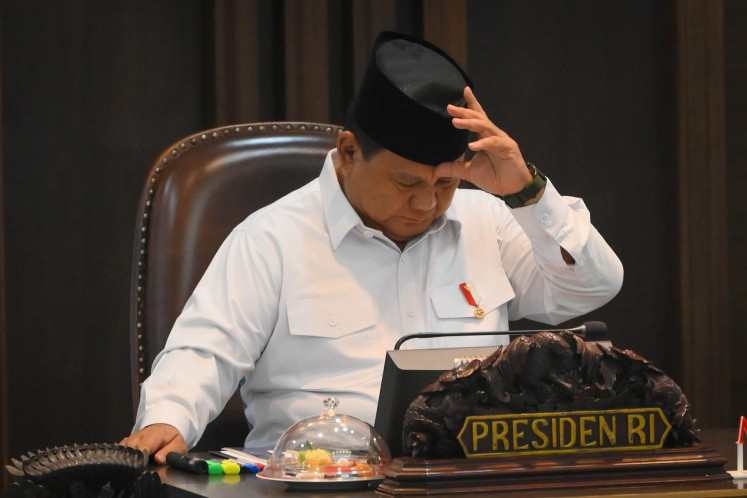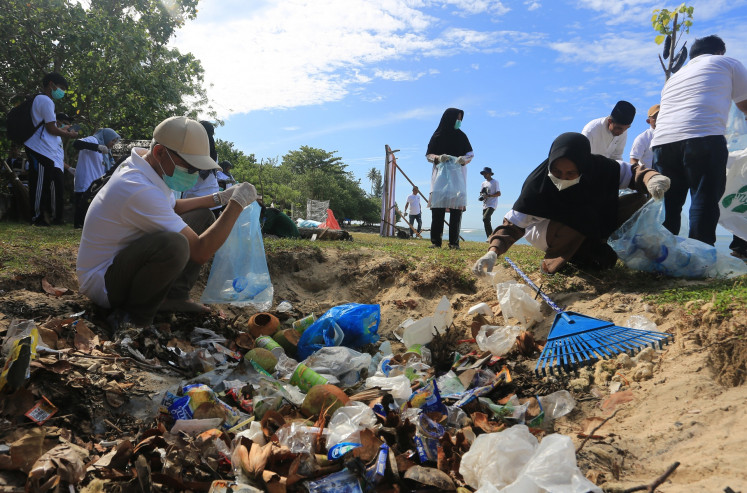Popular Reads
Top Results
Can't find what you're looking for?
View all search resultsPopular Reads
Top Results
Can't find what you're looking for?
View all search resultsLife as a cave dweller
Simple life: Aba Una arranges bamboo that he sells as firewood, one of the ways he makes a living
Change text size
Gift Premium Articles
to Anyone
S
span class="caption" style="width: 468px;">Simple life: Aba Una arranges bamboo that he sells as firewood, one of the ways he makes a living.Just say his name and residents of Lekobalo subdistrict in Gorontalo will show you the place he calls home.
He is Aba Una, 53, born Tuuna Kadir, outgoing yet reticent about his private life.
Aba Una used to live in a cave near the banks of Lake Limboto, Gorontalo’s largest pool of water.
People call him a caveman for leading an existence redolent of the time of hunter-gatherers. His choice of the unusual place to make a home triggered speculation about a frustrated family life or his pursuit of supernatural powers through asceticism.
His warm attitude toward everybody virtually conceals the mystery of his personal woes. “In the beginning, I only rested in the cave after tending to my fruit crops,” Aba said.
His married life was not a happy one. After years of arguments with his wife, Aba decided to stay with a relative for awhile.
He started to frequent the cave more often after his divorce in 1984. Gradually, he became the cave dweller he is today.
In the musty recesses at the back of a lime hill, he cooked and slept. When he spent the night for the first time there in early 2000, he had mosquito-bites all over his body. “So, I bought mosquito repellent,” he said.
At night, Aba relied on an oil lamp for light. He slept on a simple wooden couch with a sarong to guard against the cold. To meet his daily needs, he sold bananas and tubers while receiving orders for fishing nets. When he had no rice, he eats instant noodles.
In his first weeks, he saw many gray rats. “They came out of their nests and though bigger than normal rats, they were thin, weak and moving slowly, apparently starving,” he noted. After some time, all the rats died.
The cave is also home to flocks of birds, so Aba covered the mouth of the cave with a net. One morning, he found two poisonous snakes ensnared and dead on the net. “What a pity they failed to escape from the mesh. I’d have freed them if I’d found them struggling,” he said with regret.
Once, when he was performing his dawn prayers, a cobra raised its head right beside him, only to slip away after he finished praying. “I searched for it in nearby bushes but the venomous snake was gone. To my knowledge, there are no cobras in Gorontalo,” he said.
The lime rock fissure is only around four by two meters, and sits on a hill 15 meters above the ground, which is accessible by walking a steep, stony and slippery path. The limited light makes the cave’s air moist, with its black walls possibly covered with soot from the smoke of Aba’s cooking.
Several rocks protruded from the cave’s ceiling amid swarming and humming mosquitoes. “That one mustn’t be touched; it is prone to fall,” he said, pointing at one of the protrusions. Almost every day bits of stone drop from the fragile overhang.
Apart from having dreams, Aba said that at the first night there, he was approached by two people who were going to beat him, before an old man emerged to protect him. An eerie-looking woman with asymmetrical facial features was also frequently seen.
One day, he had a strange dream in the wee hours in which an aged man came to tell him that he had lost the cave where he lived. Aba awoke from the dream and caught a glimpse of the man’s back as he walked down the hill. “I’ve never meant to disturb anybody or anything. I leave it all to God,” he said.
In August of 2011 in the middle of the fasting month of Ramadhan, Aba was severely injured. Limestone in the cave fell on his right thigh, making him unable to walk for days. Informed of Aba’s troubles, his relatives came and brought him down.
“My older brother had to be carried on a stretcher,” said Salma Sune, 43, Aba’s half sister.
Aba was later treated and stayed in the classroom of a former primary school in the same complex as Salma’s home. Several homeless citizens have also made the old school building their temporary dwelling.
Now his leg has recovered but his relatives have not allowed him to return to the cave. However, Aba still regularly takes a look at the humble abode he occupied for over ten years while caring for his fruit crops. “I can’t be too far away from this cave, I simply miss it,” he said in a soft tone, without elaborating on the reason for his longing, as if hiding the murky past of his life.
Later, he revealed he has persistent headaches since his divorce. He consumes common drugs to heal his head pain whenever it sets in. In the dilapidated classroom, Aba carries on in his seclusion,
with all his yearning and chronic headaches.
In the eyes of his kin, Aba used to be a versatile traveler. “As a youth, he was one of the best carpenters,” recalled Salma. The father of three made cabinets, tables and chairs, frequently joined government construction projects, and was also a skilled trader.
In the 1980s, Aba traveled for several years in Bolaang Mongondow, North Sulawesi, where he traded merchandise. “His standard of living was fairly good while he also supplied free-range chickens,” Salma said.
Aba is an adept fishing netmaker and he still does this work up to the present for his own use or for sale. “Once he worked for a year as a fisherman in an area in Central Sulawesi,” Salma said.
Home: Aba Una stands in front of the mouth of the cave where he lives in Gorontalo.She described Aba as being like two different sides of a coin, forming a combination of warmth and mystery. She believed her brother’s decision to live in isolation had to do with his divorce.
“After the quarrels and split Aba Una seemed to suffer very much, refusing to see his wife and children,” Salma noted. Aba himself, while refusing to stay with his relatives, also tried to avoid any allusion to his family in his chats.
Regarding his supernatural ability, Salma said Aba was indeed known to be sensitive to the psychic world as a youth. When sick people asked him for help, he would give them water or recommend certain herbal drinks, making him a traditional healer.
Rahmat Taniu, 40, a relative of Aba living near the hill where the cave is located, claimed to often hear Aba reciting verses of the Koran at midnight or in the wee hours. Rahmat no longer sees anything wrong with Aba after visiting him and chatting with him many times.
Yet, he has been impressed by Aba’s charity. Once a resident wanted to buy his bananas and asked the price of the fruit. Aba asked if the buyer had enough money. Then he declined any payment and returned the money out of pity to the buyer, who came to his plantations by motorcycle taxi.











